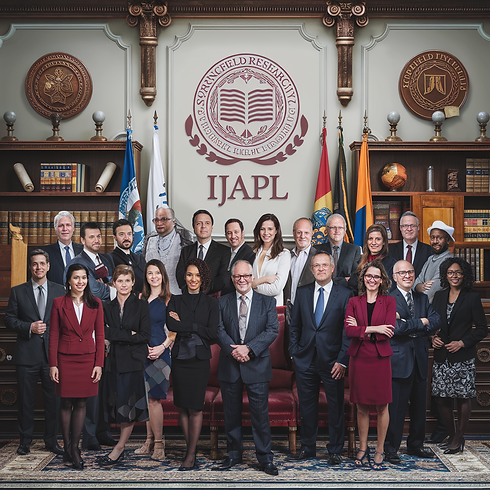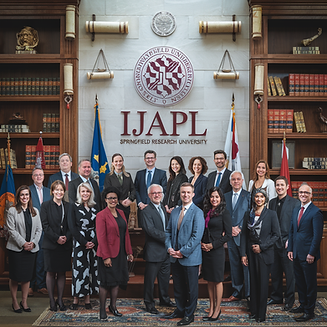Phone: +268-7619-2898 Email: frontdesk@springfieldresearch.university Hours: Mon - Fri 07:45 - 17:00
SHAPING CONTINENTAL LEGAL THOUGHT AND DIPLOMATIC IMAGINATION
Interdisciplinary Journal of Arts, Politics and Law (IJAPL) - ISSN 3080-3284
Vision
To serve as the premier intellectual forum for interdisciplinary scholarship that interrogates the aesthetics, institutions, and ideologies shaping Africa’s political and legal futures—anchoring research in sovereign authorship, cultural dignity, and transformative public discourse.
Aims & Scope
IJAPL publishes original research, critical essays, jurisprudential analyses, creative narratives, and policy reflections that bridge the domains of arts, governance, and law. It welcomes interdisciplinary and transdisciplinary work that contributes to:
🎭 Cultural Sovereignty, Aesthetic Inquiry & Arts-Based Research
⚖️ Constitutionalism, Institutional Design & Legal Reform
📜 Political Theory, Citizenship & Democratic Practice
🗣️ Narrative Justice, Public Memory & Indigenous Jurisprudence
🏛️ International Law, Treaty Analysis & Sovereign Negotiation
🪧 Activism, Rights Movements & Transgenerational Dialogue
Editorial Philosophy
IJAPL privileges scholarship that frames law and politics not simply as administrative systems but as cultural expressions and instruments of dignity. The journal seeks submissions from legal scholars, artists, policy architects, and thought leaders whose work animates continental agency and reclaims governance as a site of narrative and ethical reconstruction.

📚 Scope of the Journal
Publishing Transdisciplinary Research that Advances Education 6.0 through Jurisprudence, Civic Thought & Cultural Diplomacy
🎭 Cultural Sovereignty, Aesthetic Inquiry & Arts- Based Research
This theme champions the power of artistic expression as a strategic instrument of knowledge, resistance, and narrative reclamation. It foregrounds arts-based research methodologies that dignify indigenous voices, interrogate aesthetic paradigms, and rewrite cultural authorship across African and Global South contexts. IJAPL positions cultural sovereignty not as a symbolic gesture, but as an intellectual imperative — where visual, sonic, and performative traditions become frameworks for pedagogical innovation, legal critique, and political theory. Research under this banner resists extractive epistemologies and reasserts the African aesthetic as a form of civic design and scholarly architecture.
⚖️ Constitutionalism, Institutional Design & Legal Reform
This theme explores the design logic and philosophical foundations of African legal institutions — where state architecture, constitutional literacy, and legal reform intersect with public dignity and sovereign imagination. IJAPL convenes research on governance structures that resist neo-colonial replication and instead embody pluralistic jurisprudence, civic protection, and adaptive justice. Emphasis is placed on designing legal systems that reflect continental agency, negotiated norms, and Education 6.0-aligned reform. Contributors interrogate how institutional design can become a form of narrative authorship and policy integrity.
📜 Political Theory, Citizenship & Democratic Practice
At the intersection of philosophy, governance, and civic agency, this theme reanimates political theory through an African lens — locating citizenship not only in rights but in responsibility, dignity, and historical continuity. IJAPL solicits scholarship that excavates democratic traditions from indigenous systems, interrogates representational models, and designs citizenship architectures for plural publics. Democratic practice is reframed as a civic technology — one that must be engineered through participatory ethics, narrative legitimacy, and sovereign scholarship rooted in Education 6.0 and transgenerational knowledge.
🗣️ Narrative Justice, Public Memory & Indigenous Jurisprudence
This theme anchors justice within lived experience, ancestral wisdom, and collective recall. IJAPL positions narrative as legal infrastructure — where indigenous jurisprudence, oral traditions, and cultural memory become instruments of truth, restoration, and sovereign dignity. Contributors examine the jurisprudential weight of storytelling, the civic architecture of remembrance, and the legitimacy of ancestral law. The theme reclaims justice not just as adjudication, but as narration — where memory becomes method and the archive becomes a courtroom.
🏛️ International Law, Treaty Analysis & Sovereign Negotiation
This theme interrogates Africa’s voice and leverage within the global legal order — advancing research on treaty architectures, diplomatic frameworks, and negotiation strategies that position African states as co-authors of international norms. IJAPL emphasizes sovereign negotiation as both legal science and strategic diplomacy, foregrounding how African institutions draft, interpret, and defend agreements that safeguard dignity, resource equity, and geopolitical relevance. Research in this domain repositions international law as a site of continental agency, ethical statecraft, and postcolonial authorship.
🪧 Activism, Rights Movements & Transgenerational Dialogue
This theme honors the scholarship and strategy of civic mobilization — where rights advocacy, protest traditions, and generational discourse fuel legal reform and political transformation. IJAPL explores the intellectual architecture of movements that challenge injustice, shape constitutional ethos, and foster civic renewal. Emphasis is placed on transgenerational dialogue, activist pedagogy, and the role of education in sustaining moral imagination and structural change. The journal casts activism not merely as social action but as scholarly intervention — where movements write the law as much as they defy it.

Editorial Introduction
Interdisciplinary Journal of Arts, Politics and Law (IJAPL)
Welcome to the inaugural volume of the Interdisciplinary Journal of Arts, Politics and Law (IJAPL) — a sovereign intellectual forum rooted in Springfield Research University’s continental mandate to reframe knowledge, power, and pedagogy through Education 6.0. IJAPL is born of a critical imperative: to publish research that does not merely observe society, but authors its legal, artistic, and political futures.
This journal convenes contributors who challenge extractive epistemologies and reassert African agency across domains often siloed in conventional academia. By integrating jurisprudence, cultural expression, and civic thought under a transdisciplinary editorial logic, IJAPL carves space for scholarship that is pedagogically generative, diplomatically resonant, and structurally sovereign.
Themes in this volume interrogate constitutionalism, narrative justice, treaty negotiation, arts-based research, and the architecture of democratic practice — each advancing the idea that African institutions must write themselves into history not just through law, but through aesthetics, memory, and political design.
At Springfield Research University, publishing is not a passive act of dissemination. It is a dignified strategy of intellectual sovereignty. IJAPL stands as a continental engine for legal imagination, cultural diplomacy, and civic renewal. Here, research becomes ritual. Knowledge becomes law. And scholarship becomes a movement.







